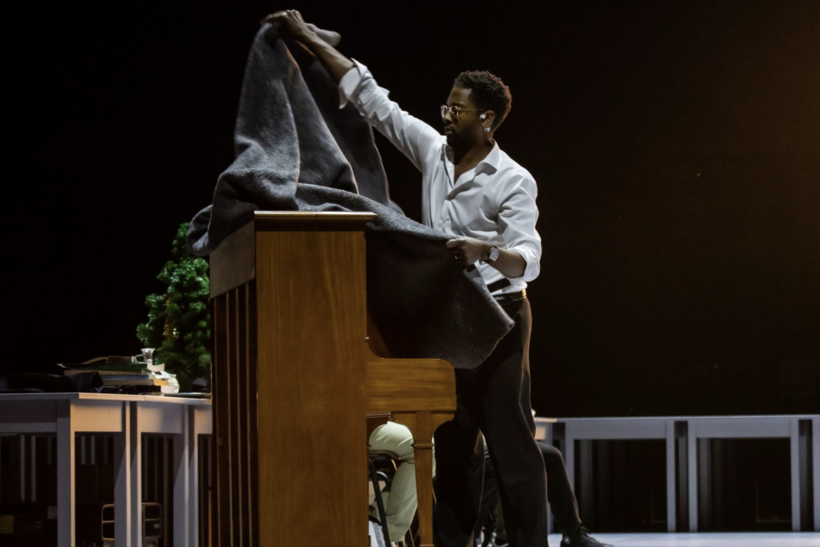Marian Anderson is singing to the nation from the steps of the Lincoln Memorial when a pair of music lovers meet and fall in love. David, an astronomer, is Jewish, a refugee from Hitler’s Germany. Delia, a Black physician’s daughter, is an aspiring soprano. A half century later, long after both are gone, their older son—a tenor who has found stardom in the operatic capitals of Europe—takes a fatal hit as Los Angeles explodes in the Rodney King riots. Thus the curtain rises and falls on the Belgian composer Kris Defoort’s mixed-race family saga The Time of Our Singing, which premiered two months ago at La Monnaie, in Brussels. Call it a masterpiece.
Elliptical in its storytelling yet novelistic in detail, The Time of Our Singing touches chords of racial reckoning and remembrance that feel thoroughly of the present moment. Yet the novel the opera is based on, by the Pulitzer Prize winner and MacArthur Fellow Richard Powers, dates to 2004.
The economical libretto is the handiwork of Peter van Kraaij, a Belgian screenwriter and director, who, like Powers and Defoort, is white. The instrumentals are scored for a classical chamber ensemble, a jazz quartet, and a prominent barroom piano. Bach and rap, Purcell and Puccini, even the sour whine of a tuning orchestra drop in at strategic moments. But rather than the facile patchwork another composer might have settled for, Defoort delivers a tapestry, varied yet coherent, like the symphony of a master. Kwamé Ryan, a Canadian conductor of Trinidadian descent, captures its unity in diversity to perfection.

Claron McFadden and Simon Bailey head an exemplary cast as Delia and David, whose defiance of convention costs them dearly. Their two sons—Jonah, the star tenor (Levy Sekgapane), and Joey, a pianist shy of the spotlight (Peter Braithwaite)—never really make peace with their mixed bloodlines. Unlike the brothers, their sister Ruth (the sensational Abigail Abraham, in a breakout performance) embraces her Blackness with a vengeance—and with consequences as devastating as they are foreseeable, even to her. Delia’s father, William (Mark S. Doss), who sees his daughter’s marriage as a betrayal of her ancestry, comes down on her with the wrath of an Old Testament prophet. In sharp contrast, a flamboyant white diva (Lilly Jørstad) pushes Jonah to break every rule, yet “deals” with their unborn baby before sharing her news.
What are we to make of these characters? Of their destinies? Wherever they go, whatever they do, race bleeds in. “There’s another wavelength wherever you point your telescope,” David sings on his deathbed, sending a last message to his daughter, who is not there. When his words reach her, they leave her cold.
For all its compassion, The Time of Our Singing offers no pat answers. Cultural politics being what they are, I’m not holding my breath for a transfer to the Met or (better yet) to Broadway. But those are the kind of showcases it deserves.
The Time of Our Singing is available for streaming on the OperaVision Web site
Matthew Gurewitsch writes about opera and classical music for AIR MAIL. He lives in Hawaii

